Artifacts found at an archaeological site in Israel provide the foundations for a series of fictional snapshots into the region's history. The time-span covered is ambitious in the usual Michener fashion, from Neolithic times up into the 1960s. The focus is mostly on the Jewish peoples, but some time is given to early pre-Judaic religions, pagan Romans, Christianity, the Crusaders, and Islam.
Michener is a master at making the grand sweep of human history accessible, but sometimes in order to do this he simplifies things somewhat. It seems especially noticeable in this book. Some of the characters lack depth. The female characters are particularly one-note. But then again, he has to cover a lot of territory, so...
The human drama seemed somewhat repetitive from section to section, but the historical details were quite fun. I especially liked the story of building the underground tunnel to secure the town's water source. It was obviously based on Hezekiah's tunnel in Jerusalem, an amazing engineering feat given the primitive technology at the time. Other portions borrow from Josephus's writings to provide further authenticity. The history stuff is good. The actual fiction is just okay.
The Source review
 Posted : 11 years, 9 months ago on 25 August 2013 09:08
(A review of The Source)
Posted : 11 years, 9 months ago on 25 August 2013 09:08
(A review of The Source) 0 comments, Reply to this entry
0 comments, Reply to this entry
Evolution review
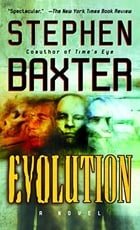 Posted : 11 years, 9 months ago on 23 August 2013 07:35
(A review of Evolution)
Posted : 11 years, 9 months ago on 23 August 2013 07:35
(A review of Evolution)99.9% of all species that have ever existed are now extinct. What if anything makes us special? And what does the future hold for us a species?
This novel tackles those questions in an ambitious 600+ collection of chronological vignettes. These cover the proto-simian creature Purgatorius, early primates like notharctus, hominids such as australopithecines & Homo erectus, Neanderthals, modern day humans, and imagined future possibilities for our kind. There's plenty of scientific exposition and speculation to mull over on the long journey. (Also generous amounts of sex and violence, but I suppose that's par for the course.)
PS: I found the description of the Cretaceous-Tertiary extinction (the one that got the dinosaurs) to be particularly riveting. Several theories exist regarding the cause, but Baxter goes with the most popular scenario: asteroid impact. Those who like apocalyptic fiction should particularly enjoy this chapter.
This novel tackles those questions in an ambitious 600+ collection of chronological vignettes. These cover the proto-simian creature Purgatorius, early primates like notharctus, hominids such as australopithecines & Homo erectus, Neanderthals, modern day humans, and imagined future possibilities for our kind. There's plenty of scientific exposition and speculation to mull over on the long journey. (Also generous amounts of sex and violence, but I suppose that's par for the course.)
PS: I found the description of the Cretaceous-Tertiary extinction (the one that got the dinosaurs) to be particularly riveting. Several theories exist regarding the cause, but Baxter goes with the most popular scenario: asteroid impact. Those who like apocalyptic fiction should particularly enjoy this chapter.
 0 comments, Reply to this entry
0 comments, Reply to this entry
The Plains of Passage review
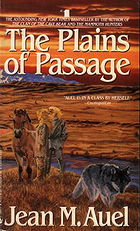 Posted : 11 years, 9 months ago on 23 August 2013 06:42
(A review of The Plains of Passage)
Posted : 11 years, 9 months ago on 23 August 2013 06:42
(A review of The Plains of Passage)It seems like each successive book in the Earth's Children series is more ponderous and contains less meaningful action than the one before. This particular volume is basically a Stone Age travelogue. If you're interested in ornately detailed descriptions of Ice Age scenery, flora, fauna, weather conditions, and want to learn handy tips for traversing glaciers, you should like this. If you're looking for a dynamic, action-packed story however, you're probably going to be disappointed.
The only notable action that occurs in this book features a female villain who has all the cardboard cut-out gaudiness of the bad guy in a dime Western. Instead of taking her seriously, I found her annoying and actually somewhat insulting to my intelligence as a reader.
This book is like the previous books, except with yet more superfluous pages and the same exact narrative formula dressed in different clothes.
The only notable action that occurs in this book features a female villain who has all the cardboard cut-out gaudiness of the bad guy in a dime Western. Instead of taking her seriously, I found her annoying and actually somewhat insulting to my intelligence as a reader.
This book is like the previous books, except with yet more superfluous pages and the same exact narrative formula dressed in different clothes.
 0 comments, Reply to this entry
0 comments, Reply to this entry
The Mammoth Hunters: Earth's Children, Book Three review
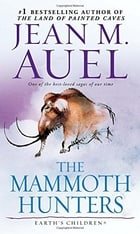 Posted : 11 years, 9 months ago on 23 August 2013 06:39
(A review of The Mammoth Hunters: Earth's Children, Book Three)
Posted : 11 years, 9 months ago on 23 August 2013 06:39
(A review of The Mammoth Hunters: Earth's Children, Book Three)In the third book of the Earth's Children series, Ayla and Jondalar have left Ayla's remote valley home and have entered the territory of the Mamutoi People. This is Ayla's first real encounter with a tribe of her own Cro-Magnon race and she makes quite a first impression, with her tame horses and myriad inventions. However, controversy ensues when the Mamutoi learn that Ayla was raised by Neanderthals or "Flatheads". Will she still be accepted?
Meanwhile, Ayla and Jondalar are having trouble in the romance department. Misinterpretations and misunderstandings abound. Ayla's cultural background makes it hard for her to communicate her needs, while Jondalar is wallowing in insecurity. To be honest, Jondalar really annoyed me in this book. He comes off as a self-absorbed, self-pitying boob with no observational skills what-so-ever. "Gee, Ayla looks unhappy, but I'm sure it has nothing to do with me!" Also: We don't need to hear for the umpteenth time how Ayla is the only female who can accommodate his massive member. We get it, Jean, he's well-hung. (Rolls eyes)
Ayla also has a brief dalliance with an exotic, dark-skinned member of the Mamutoi, Ranec, who seems less like an erstwhile lover and more like a fawning worshiper. The love triangle between Ayla, Ranec, and Jondalar seems to drag on forever.
Good points: The descriptions of weather, glacial landscapes, animals, and tribal customs are as interesting and meticulous as ever.
And the character Rydag, a Neanderthal-Cro Magnon hybrid boy, is a poignant reminder of Ayla's own lost child. Her interactions with him are bittersweet and compelling.
Meanwhile, Ayla and Jondalar are having trouble in the romance department. Misinterpretations and misunderstandings abound. Ayla's cultural background makes it hard for her to communicate her needs, while Jondalar is wallowing in insecurity. To be honest, Jondalar really annoyed me in this book. He comes off as a self-absorbed, self-pitying boob with no observational skills what-so-ever. "Gee, Ayla looks unhappy, but I'm sure it has nothing to do with me!" Also: We don't need to hear for the umpteenth time how Ayla is the only female who can accommodate his massive member. We get it, Jean, he's well-hung. (Rolls eyes)
Ayla also has a brief dalliance with an exotic, dark-skinned member of the Mamutoi, Ranec, who seems less like an erstwhile lover and more like a fawning worshiper. The love triangle between Ayla, Ranec, and Jondalar seems to drag on forever.
Good points: The descriptions of weather, glacial landscapes, animals, and tribal customs are as interesting and meticulous as ever.
And the character Rydag, a Neanderthal-Cro Magnon hybrid boy, is a poignant reminder of Ayla's own lost child. Her interactions with him are bittersweet and compelling.
 0 comments, Reply to this entry
0 comments, Reply to this entry
The Valley of Horses: Earth's Children 2 review
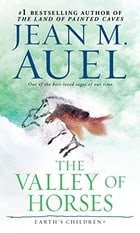 Posted : 11 years, 9 months ago on 23 August 2013 06:37
(A review of The Valley of Horses: Earth's Children 2)
Posted : 11 years, 9 months ago on 23 August 2013 06:37
(A review of The Valley of Horses: Earth's Children 2)After being rather roughly ejected from her adoptive Clan of neanderthals, Auel's Cro-Magnon heroine Ayla has to survive on her own in a remote valley. Meanwhile, a tall blue-eyed stranger is traveling cross-country with his brother, on a collision course with unexpected tragedy and romance.
Sounds a bit hokey, does it not?
Add a tamed cave lion and horse as plucky sidekicks, endless overly-detailed descriptions of various tribal customs, and a bunch of Stone Age conjugation (if you know what I mean, wink wink) and it becomes a 600 pg. coagulation of "Meh" moments.
I first read it at age 10, so I was fairly forgiving of its many flaws at the time. I'm not nearly so forgiving after a recent re-read, but I think I'll let it squeak by with 3.5 stars just for old time's sake.
Sounds a bit hokey, does it not?
Add a tamed cave lion and horse as plucky sidekicks, endless overly-detailed descriptions of various tribal customs, and a bunch of Stone Age conjugation (if you know what I mean, wink wink) and it becomes a 600 pg. coagulation of "Meh" moments.
I first read it at age 10, so I was fairly forgiving of its many flaws at the time. I'm not nearly so forgiving after a recent re-read, but I think I'll let it squeak by with 3.5 stars just for old time's sake.
 0 comments, Reply to this entry
0 comments, Reply to this entry
The Clan of the Cave Bear: Earth's Children, Book One review
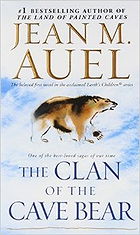 Posted : 11 years, 9 months ago on 23 August 2013 06:34
(A review of The Clan of the Cave Bear: Earth's Children, Book One)
Posted : 11 years, 9 months ago on 23 August 2013 06:34
(A review of The Clan of the Cave Bear: Earth's Children, Book One)I actually read this book for the first time in 3rd grade. It was my second adult novel (after Watership Down) and I voraciously gobbled up every abundant detail of the Cro-Magnon Ayla's adventures with her adoptive Neanderthal clan.
I've given The Clan of the Cave Bear a re-read after all this time, and I still find Jean Auel's descriptions impressively meticulous. Whether it's mammoths, herbs, or Neanderthal tool-making techniques, Auel provides plenty of information for the reader to chew on. It's clear she did her research.. and then some.
As for plot, the story-line and conflict in this first book will always trump the rest of the series for me. The Clan and their customs are fascinatingly different and Ayla's often painful attempts to assimilate into their alien culture makes for compelling reading. The other high point is the way Ayla's adoptive Neanderthal parents are rendered. The wise mogur, Creb and the loving medicine woman, Iza are both beautifully fleshed out characters. Even Brun the leader is fairly well developed. And Broud? Well, brats are fairly easy characters to write I think. Broud is fairly one note, but he serves his purpose in the story well enough. These characters come off the pages like real people, something that seems to happen less and less as the series progresses.
Worth a look. And possibly mildly inappropriate for 3rd graders. Depends on the 3rd grader.
I've given The Clan of the Cave Bear a re-read after all this time, and I still find Jean Auel's descriptions impressively meticulous. Whether it's mammoths, herbs, or Neanderthal tool-making techniques, Auel provides plenty of information for the reader to chew on. It's clear she did her research.. and then some.
As for plot, the story-line and conflict in this first book will always trump the rest of the series for me. The Clan and their customs are fascinatingly different and Ayla's often painful attempts to assimilate into their alien culture makes for compelling reading. The other high point is the way Ayla's adoptive Neanderthal parents are rendered. The wise mogur, Creb and the loving medicine woman, Iza are both beautifully fleshed out characters. Even Brun the leader is fairly well developed. And Broud? Well, brats are fairly easy characters to write I think. Broud is fairly one note, but he serves his purpose in the story well enough. These characters come off the pages like real people, something that seems to happen less and less as the series progresses.
Worth a look. And possibly mildly inappropriate for 3rd graders. Depends on the 3rd grader.
 0 comments, Reply to this entry
0 comments, Reply to this entry
Troilus and Cressida (Folger Shakespeare Library) review
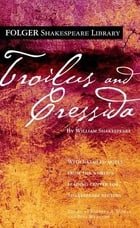 Posted : 11 years, 9 months ago on 22 August 2013 09:59
(A review of Troilus and Cressida (Folger Shakespeare Library))
Posted : 11 years, 9 months ago on 22 August 2013 09:59
(A review of Troilus and Cressida (Folger Shakespeare Library))This is one of Shakespeare's problem plays, meaning it doesn't fit neatly into the category of tragedy or comedy, but occupies its own hybrid niche. "Black comedy" or "scathing satire" would probably be a fairly apt description for this outing. It's actually a lot of fun to read, especially if you like humor flavored with a heavy dose of cynicism.
The "romantic" leads of the play's title, Troilus and Cressida, are no Romeo and Juliet. Not even by a long shot. Troilus is a superficial lad, concerned only with glory and momentary pleasures, and his love for Cressida lasts only about as long as her maidenhood. Cressida is just as fickle as her lover, swiftly shifting her physical affections to the enemy camp when she gets traded for ransom.
This play is very anachronistic. It's not the sort of tale that resides in the ancient dusty battles of Greek times; it's very much a product of Shakespeare's era. This is what makes it such an interesting read for me. It reflects the rapidly changing world of a burgeoning global market, a place where chaos, hypocrisy, and corruption were rife. There are numerous references in the play to venereal disease, especially the notorious pox (syphilis), which was just beginning its lengthy reign in Europe.
I do love it when Shakespeare gets gross, and he obliges his disgusting side with unapologetic alacrity here. "Thou crusty botch of nature", "thou sarsenet flap for a sore eye", and so on.. Shakespeare is a demigod when it comes to heinous insults, and Troilus and Cressida is brimful of humdingers.
I also love Shakespeare plays for the treasure-trove of words, some of which should still be in use instead of being consigned to obscurity.
Two words from this play that caught my fancy:
Oppugnancy - meaning opposition. I like its bouncy character, like a rubber ball on the tongue.
Gloze - a verb meaning to comment, make excuses for, or to use ingratiating language.
The "romantic" leads of the play's title, Troilus and Cressida, are no Romeo and Juliet. Not even by a long shot. Troilus is a superficial lad, concerned only with glory and momentary pleasures, and his love for Cressida lasts only about as long as her maidenhood. Cressida is just as fickle as her lover, swiftly shifting her physical affections to the enemy camp when she gets traded for ransom.
This play is very anachronistic. It's not the sort of tale that resides in the ancient dusty battles of Greek times; it's very much a product of Shakespeare's era. This is what makes it such an interesting read for me. It reflects the rapidly changing world of a burgeoning global market, a place where chaos, hypocrisy, and corruption were rife. There are numerous references in the play to venereal disease, especially the notorious pox (syphilis), which was just beginning its lengthy reign in Europe.
I do love it when Shakespeare gets gross, and he obliges his disgusting side with unapologetic alacrity here. "Thou crusty botch of nature", "thou sarsenet flap for a sore eye", and so on.. Shakespeare is a demigod when it comes to heinous insults, and Troilus and Cressida is brimful of humdingers.
I also love Shakespeare plays for the treasure-trove of words, some of which should still be in use instead of being consigned to obscurity.
Two words from this play that caught my fancy:
Oppugnancy - meaning opposition. I like its bouncy character, like a rubber ball on the tongue.
Gloze - a verb meaning to comment, make excuses for, or to use ingratiating language.
 0 comments, Reply to this entry
0 comments, Reply to this entry
A History of the World in 10 1/2 Chapters review
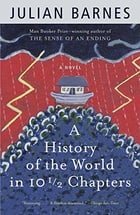 Posted : 11 years, 10 months ago on 28 July 2013 12:07
(A review of A History of the World in 10 1/2 Chapters)
Posted : 11 years, 10 months ago on 28 July 2013 12:07
(A review of A History of the World in 10 1/2 Chapters)Labeling this as a novel is somewhat of stretch, as this book is more of a loosely-connected collection of short stories. There's a definite nautical theme running through many of the tales, recurring mentions of woodworms & Noah's Ark, ironic twists, and quite a few wry jabs at Judeo-Christian myth. Quite fun, with some surprisingly poignant interludes.
PS: One of the stories is about The Raft of the Medusa, a 19th century painting by Theodore Gericault. Instead of making the reader Google it, there's a surprisingly generous color foldout of the work in the book. I thought that was a nice touch.
PS: One of the stories is about The Raft of the Medusa, a 19th century painting by Theodore Gericault. Instead of making the reader Google it, there's a surprisingly generous color foldout of the work in the book. I thought that was a nice touch.
 0 comments, Reply to this entry
0 comments, Reply to this entry
The Masks of God: Primitive Mythology v. 1 (Arkana) review
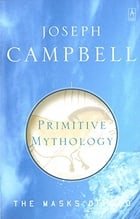 Posted : 11 years, 10 months ago on 28 July 2013 09:16
(A review of The Masks of God: Primitive Mythology v. 1 (Arkana))
Posted : 11 years, 10 months ago on 28 July 2013 09:16
(A review of The Masks of God: Primitive Mythology v. 1 (Arkana))Joseph Campbell was a veritable demigod of comparative mythology. He was brilliant at discovering connections in seemingly unrelated myths across the globe, illuminating the ways in which beliefs moved from culture to culture over thousands of years.
However: If you haven't read Campbell before I suggest you take The Hero with a Thousand Faces (Masks of God Lite) out for a spin first. It's only one book, and far less of a commitment. You'll be able to tell immediately if Campbell's dense & astoundingly long-winded writing style is something you can hang with, because hey, it's not for everyone.
First off, be prepared to encounter verbosity so thick you may need a mental machete to hack your way through it. Secondly, expect paragraphs and individual sentences so long that you may need to hire a cartographer to draw you a freaking map of them. If this doesn't daunt you than by all means, read The Masks of God. In this series, Campbell does not hold back. The contents of his incredibly fertile and overstuffed brain overflow from the pages in a deluge of information. He tells great stories from a plethora of different cultures. He loves to make Byzantine diagrams and complicated explanations where simplicity would suffice.. And he likes to namedrop like crazy. Sigmund Freud, Thomas Mann, Oswald Spengler, Friedrich Nietzsche, James Joyce.. You will be hearing a lot about these guys. (No girls, though. Conspicuously absent, but I suppose that's not surprising.)
As for this particular volume, Primitive Mythology, the Freudian Whackadoo is strong here. Mighty strong. It reaches a crescendo around pg. 73 to pg. 76. If you have an allergy to Freudian concepts, you might want to skip it.
This volume is mostly concerned with comparing and contrasting the myths of early agriculturally based societies with the beliefs of ancient hunter-gatherer peoples. The former would concur with Star Trek's Spock: "The needs of the many outweigh the needs of the few." whereas the latter, well, read the book and find out... but don't say I didn't warn you.
However: If you haven't read Campbell before I suggest you take The Hero with a Thousand Faces (Masks of God Lite) out for a spin first. It's only one book, and far less of a commitment. You'll be able to tell immediately if Campbell's dense & astoundingly long-winded writing style is something you can hang with, because hey, it's not for everyone.
First off, be prepared to encounter verbosity so thick you may need a mental machete to hack your way through it. Secondly, expect paragraphs and individual sentences so long that you may need to hire a cartographer to draw you a freaking map of them. If this doesn't daunt you than by all means, read The Masks of God. In this series, Campbell does not hold back. The contents of his incredibly fertile and overstuffed brain overflow from the pages in a deluge of information. He tells great stories from a plethora of different cultures. He loves to make Byzantine diagrams and complicated explanations where simplicity would suffice.. And he likes to namedrop like crazy. Sigmund Freud, Thomas Mann, Oswald Spengler, Friedrich Nietzsche, James Joyce.. You will be hearing a lot about these guys. (No girls, though. Conspicuously absent, but I suppose that's not surprising.)
As for this particular volume, Primitive Mythology, the Freudian Whackadoo is strong here. Mighty strong. It reaches a crescendo around pg. 73 to pg. 76. If you have an allergy to Freudian concepts, you might want to skip it.
This volume is mostly concerned with comparing and contrasting the myths of early agriculturally based societies with the beliefs of ancient hunter-gatherer peoples. The former would concur with Star Trek's Spock: "The needs of the many outweigh the needs of the few." whereas the latter, well, read the book and find out... but don't say I didn't warn you.
 0 comments, Reply to this entry
0 comments, Reply to this entry
Origins: Human Evolution Revealed review
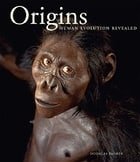 Posted : 11 years, 10 months ago on 28 July 2013 08:08
(A review of Origins: Human Evolution Revealed)
Posted : 11 years, 10 months ago on 28 July 2013 08:08
(A review of Origins: Human Evolution Revealed)This paleoanthropology book has two things going for it: it boasts the latest information & discoveries (as 0f 2010) and it has stunning artistic reconstructions of hominids, Neanderthals, and Cro-Magnon humans. (courtesy of John Gurche).
The only noticeable issue is with the unusual amount of typos in the text. Maybe the book was rushed to press or the editor had a headache that day, but the errors are multiple and in a few cases rather glaring. Still, a good coffee table book and a decent introduction to our early kin.
The only noticeable issue is with the unusual amount of typos in the text. Maybe the book was rushed to press or the editor had a headache that day, but the errors are multiple and in a few cases rather glaring. Still, a good coffee table book and a decent introduction to our early kin.
 0 comments, Reply to this entry
0 comments, Reply to this entry
 Login
Login
 Home
Home 3 Lists
3 Lists 120 Reviews
120 Reviews Collections
Collections